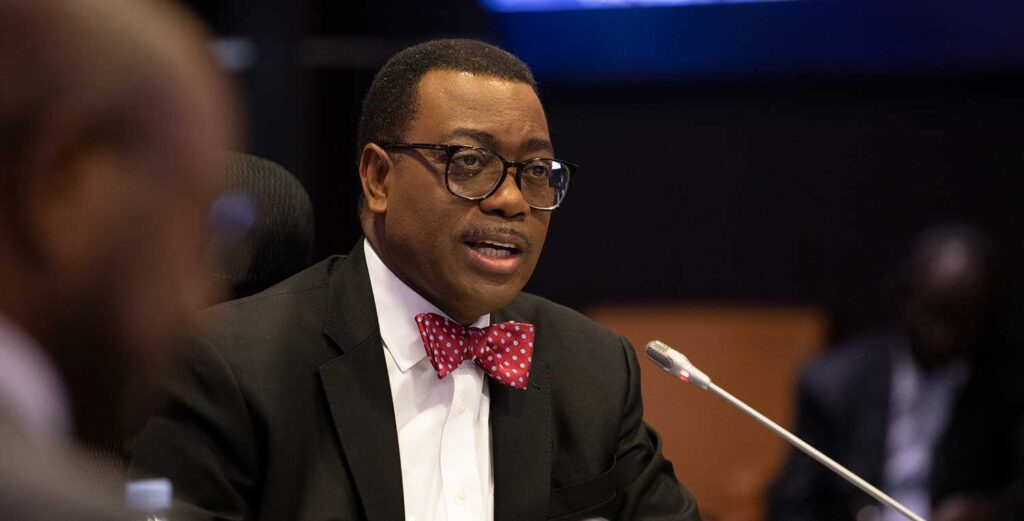After a decade at the helm of the African Development Bank (AfDB), Akinwumi Adesina is preparing to exit the role with a record of significant growth and development.
Speaking yesterday during a media breakfast in Abidjan, Côte d’Ivoire, he revealed that the Bank’s capital base had expanded from $93 billion in 2015 to $325 billion – an extraordinary increase over his two-term tenure.
Adesina, the first Nigerian to serve as AfDB President, highlighted the far-reaching impact of the Bank’s strategic priorities, known as the “High 5s”, which have touched over half a billion lives across the continent.
READ ALSO: ‘Without reliable power, Nigeria’s economy ‘ll remain stuck in slow growth’ – Adesina
These focus areas, improving energy access, boosting agriculture, industrialising economies, deepening regional integration, and enhancing living conditions, have yielded tangible benefits in healthcare, transport, electricity, water, and food security.
Reflecting on his time in office, Adesina said: “I’m proud that we’ve mobilised more resources than at any point in the Bank’s history. Just yesterday, our Vice President of Finance confirmed our capital now stands at $325 billion, up from $318 billion due to exchange rate gains. That scale of funding has enabled the Bank to reshape Africa’s development trajectory.”
He also recalled the challenges and accomplishments that marked his presidency, noting the strain and determination involved.
“When I assumed office, I had no grey hair. A decade later, my hair tells the story of tireless commitment to transforming this institution into a globally respected player – one that has consistently stood up for Africa.”
Among the milestones he cited was the largest-ever replenishment of the African Development Fund (ADF), which saw $8.9 billion raised to support the continent’s most vulnerable nations.
He also recounted the launch of the $1.5 billion Emergency Food Production Facility in response to the Russia-Ukraine war, which helped 13 million farmers in 29 countries access vital inputs and resulted in 44 million metric tonnes of food – far exceeding expectations.
Under Adesina’s leadership, the Bank’s work has led to major improvements across key sectors: 128 million people gained access to better healthcare,121 million benefited from enhanced transport infrastructure, 104 million achieved food security, 63 million received access to safe water, 34 million accessed improved sanitation and 28 million now have electricity.
Looking ahead, Adesina urged his successor to remain firm in defending Africa’s interests and avoid shallow development efforts.
“This role requires vision, courage, and conviction. It’s not about popularity. It’s about making tough choices that advance the continent. If you’re not prepared to do that, this job isn’t for you,” he said.
His departure comes at a critical moment.
The Bank faces financial headwinds following proposed funding cuts by the US government, with reports suggesting up to $555 million could be withdrawn from both the AfDB and its concessional arm, the ADF.
To be elected, a new president must secure a majority of votes from both African and non-African member states, 54 and 81 countries respectively.
The decision will be made on Thursday at the Bank’s annual meetings in Abidjan, which draw top finance officials and heads of state from across the continent.
As the institution seeks to raise $25 billion in its next ADF replenishment cycle this November, up from $8.9 billion last time, the incoming leader will face the challenge of sourcing funds amid competing global demands.
Among the five contenders for the role are former officials from Senegal, South Africa, Zambia, Chad and Mauritania.
Notably, Senegal’s Amadou Hott – a former AfDB Vice President for Power, Energy, Climate and Green Growth, has proposed harnessing domestic private capital to reduce Africa’s dependence on external borrowing.
He noted the continent holds $4.5 trillion in combined individual and institutional wealth that remains largely untapped.
“The real game-changer will be unlocking our own savings and investment potential,” Hott said in an interview with Bloomberg.
He also supports the creation of an African credit rating agency to offer fairer assessments based on local data, arguing that African nations often face unjustifiably high borrowing costs compared to peers with similar credit ratings elsewhere.
READ ALSO: Onanuga faults Adesina’s claim Nigerians economy worse off than in 1960
He added that promoting local currency lending would lower debt risk and improve long-term access to capital across the continent.
The new AfDB president, to be elected on 29 May, will take office at a time of growing development demands, from infrastructure and health to climate resilience.



